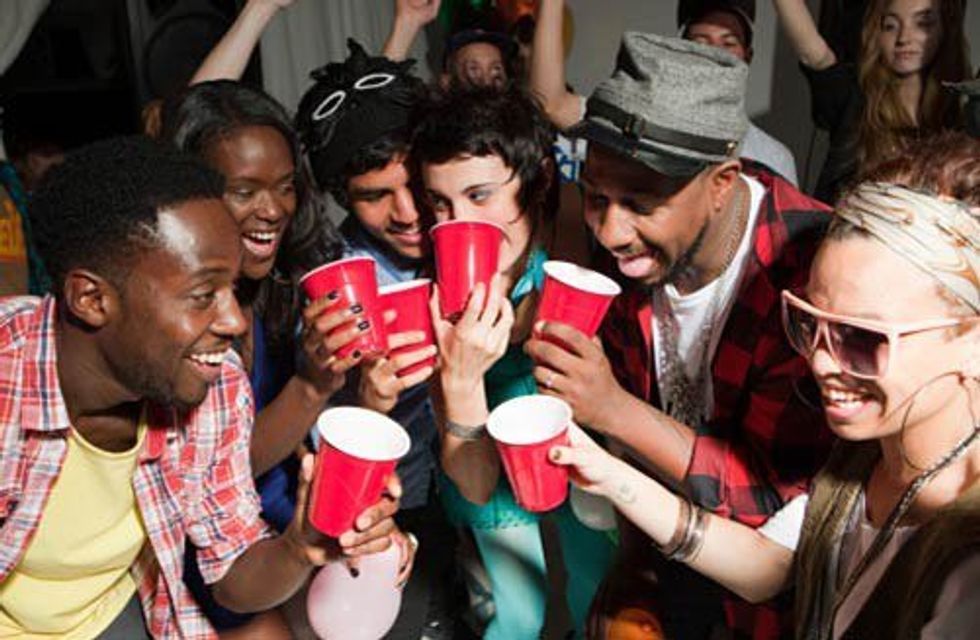This week, I turned 21. As for most in the US, celebration ensued--involving lots of (finally legal) alcohol. On my birthday I sat on the couch with a beer in hand and couldn’t help but chuckle because it felt like a farce. I’d done this same thing dozens of times before; the only difference is that this time I walked into the the liquor store myself to buy it instead of handing cash to an over-21 friend. And I know for a fact at least 68 percent have done something similar (since that is the proportion of high school seniors who have tried alcohol, and that number would only go up for college students). But despite the general disregard for it, the law states that you must be 21 to buy and consume alcohol (details varying by state).
Many (including myself) have asked, “Why so high?” seeing as how pretty much every other privilege and responsibility of being a legal adult kicks in at 18. Not to mention, out of the countries where drinking at all is legal, 90.2 percent have a drinking age of 19 or below (in fact, there are 19 countries without one at all).
Even though it goes against the grain of the rest of world, there are a few reasons why we have specifically set the drinking age so high. There are a lot of scary numbers you can use to talk about young people drinking. For example, over 600,000 students each year are injured or killed due to alcohol related accidents. Nearly 100,000 students each year are victims of sexual assault or rape where one or both parties had been drinking. People who begin drinking at a young age are more likely to become addicted than other people. About a quarter of college students admit that their drinking habits affect their school work.
The worry about problems like these, in addition the the threat of drunk driving, is what led to the increase in drinking age from 18 to 21 in 1984. This change technically happened on a state level, but it was effectively a national law because the federal government promised to withhold highway funding from states that didn’t raise their drinking age to 21. This may seem heavy handed, but their point of view definitely makes sense. Drunk driving is a huge cause of auto injuries and deaths, and it makes sense that someone relatively new to driving (a teenager) would be even more of a menace if driving under the influence. Before 1984, the most common drunk drivers were between the ages of 16 and 20. And in this respect, the mandate was very effective. In the years following the drinking age increase, the percentage of teenagers involved in accidents who were drunk was cut in half.
Great, right? Of course, a reduction in drunk driving is definitely a win. But there exists negative side effects to such a high drinking age as well. Even though fewer teens were driving drunk, that doesn’t mean they were actually drinking any less. In a survey across 56 different universities, it was observed that underage students actually drank more than their of-age peers. This actually shouldn’t be that surprising if you have ever met a teenager. Put the inherent teen desire to rebel a little together with the total change in scenery and freedom from parental supervision and of course they will gladly participate in the mildly illegal but assume transgression of underage drinking. And this would be fine, if it were happening in moderation. But it is not. According to the CDC, a whopping 90 percent of the alcohol consumed by underage people is consumed via binge-drinking. For context, a binge is defined as having more than four to five standard drinks in a two-hour time period. As someone who was once a college freshman, this statistic seems reasonable. Assuming you lack a fake ID, your ability to drink is dependent upon other people sharing with you so you take the opportunities you get. This ends up being a pretty big component of the generally unhealthy “party culture” that happens at many universities.
Thinking about the huge problem of binge-drinking at universities made me wonder if things were the same in other countries. Interestingly, Americans drink less alcohol per capita than Europeans, but are killed or injured due to alcohol at a higher rate. What’s the difference? Based on anecdotal evidence from people I know who are from or have lived in Europe, it’s entirely cultural. For example, most Italians will have at least one glass of wine every night with dinner. It’s something done without thinking, without attaching any fear or mystique to beverages that people of all ages have been drinking for centuries. In Spain, with a drinking age of 16 (lower if a parent is present), people often walk around casually with drinks in hand, and there’s no separation of places where you are “supposed to” or “not supposed to” be drinking.
In my opinion, this brief comparison to European countries highlights the issue. As a culture, it seems like we’ve built up drinking to teenagers as something mysterious and dangerous. I’ve known a girl in my freshman year to panic over potentially being seen holding the classic red Solo cup in a photo that her parents might see and respond in a somewhat draconian manner by forcing her to move back into their house. That is an extreme example, but that it happens at all is telling about the unhealthy relationship we have with alcohol as a nation. We are culturally alcoholic, lacking an understanding of the word “moderation.”
Personally, I’d say the biggest culprit is our high drinking age. I sure I’m not the only to whom 21 feels like an arbitrary line in the sand. In a closed system like a university, the mixing of over and underage people results in a manufactured power dynamic that builds up the idea that binge-drinking is something normal to do. Then you end up with people saying absurd and dangerous things like you haven’t really experienced college until you’ve gone to a party you couldn’t remember the next morning or woken up next to someone whose last name you don’t know.
The bottom line is that though there may have been a correlation between raising the drinking age and decreasing drunk driving incidents, the culture that has grown larger as a result is not worth it. The fact is, the vast majority of people under the age of 21 have had alcohol. It’s assumed that underage students will drink often and in excess. This line in the sand between legal and not has encouraged the toxic habit of binge drinking in many young adults. By making 21 a magic number, it turns alcohol into something special and alluring because if its very forbidden-ness, when in reality it is just one of the many ways people have found to distract and content themselves with the mundane days of their lives.





















